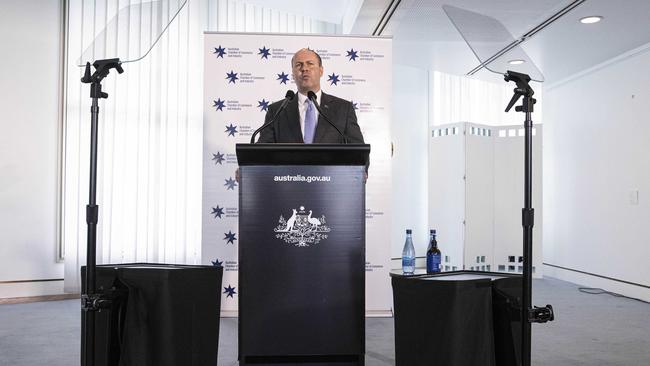Simpler credit will help kickstart economy

With billions of dollars a month being lent to consumers and businesses, credit underpins investment and jobs, and enables Australians to pursue their dream of owning a home.
As the nation strives to recover from COVID-19, the provision of and access to credit will be critical to rebuilding every sector of our economy, from hospitality to tourism, construction to retail.
Liquidity in the banking system is not an issue. Through the actions of the Morrison government and the Reserve Bank of Australia more than $200bn has been made available to lenders.
The cost of borrowing has never been lower, with the cash rate at 25 basis points.
The challenge today is a different one. The burden of regulation has been increasing and with it have come more obstacles for the consumer, making it harder to access credit.
What started a decade ago as a principles-based framework to regulate the provision of consumer credit has evolved into an overly prescriptive, complex, costly, one-size-fits-all regime known as responsible lending obligations.
These so-called RLOs apply to lending by banks, credit unions and other financiers to ensure that “unsuitable” credit is not provided to consumers. These principles-based obligations have given rise to almost 100 pages of Australian Securities & Investments Commission regulatory guidance.
Across time, lenders have become increasingly risk averse and overly conservative. As a consequence, borrowers, irrespective of their financial circumstances, have faced an ever more intrusive, difficult and drawn-out approval process.
It is common for a person applying for a mortgage to be asked to explain individual discretionary spending and to provide verification of Netflix and Spotify subscriptions, UberEats or MenuLog usage or other details — all for the lender to be confident that it cannot be held liable in the event the borrower cannot repay the loan. Even so, lenders remain at risk should they rely on information provided by the borrower that subsequently proves to be incorrect or false.
It is no surprise that Australians have found it more difficult to obtain the credit they are seeking, with many giving up.
In the words of Reserve Bank governor Philip Lowe just last month: “The way we’ve translated these principles into reality needs looking at again.”
There are numerous real-life examples that illustrate this point.
A retiree who recently lost her husband and had $430,000 in her account, as well as her husband’s refundable accommodation deposit being repaid to his estate, was informed by her lender that she couldn’t obtain a new credit card in her own name as it would put her in “severe financial distress”. The lender could not consider her assets in her credit evaluation — only actual income received each month.
Another example was a first-home buyer who put down a deposit after receiving pre-approval from the bank. Before settlement he received a promotion at work that involved a salary increase.
He notified the lender before his loan was finalised and the bank told him that the promotion constituted a change in circumstance, requiring his loan application to be reassessed and delayed because he didn’t have a past history of income at that level to rely on.
Even modest increases in credit limits for existing customers trigger the need for a reassessment of the customer’s financial circumstances. For example, a customer who has paid down $200,000 of their $500,000 mortgage but subsequently seeks a $1000 increase on a $10,000 credit card limit needs to fill in a long-form credit application to reverify income, expenses and other liabilities to check if they haven’t changed since the original mortgage was approved.
In light of these and countless other examples the government is moving to simplify and clarify the law, which will reduce the cost and time faced by consumers and small businesses seeking to access credit. This will be done by removing the RLOs for all lenders except for those using small account credit contracts or consumer leases.
Lenders that presently are regulated by the Australian Prudential Regulation Authority will remain subject to APRA’s lending standards, which already require lenders to “make reasonable inquiries and take reasonable steps to verify a borrower’s available income”. For lenders that are not regulated by APRA at present, the government will seek to mirror APRA’s lending standards, with ASIC continuing to monitor compliance.
In the case of lending to small business, it will be exempted from these new requirements.
This new framework will remove the overlap and ambiguity for consumers and move away from the one-size-fits-all approach. It will target the strongest consumer protections where they are most needed. In doing so, it enables the vast majority of Australians to benefit from improved access to credit.
Importantly, the many additional protections the Coalition has introduced will remain in place, including the best interest duty for mortgage brokers, ASIC’s product intervention power, design and distribution obligations on lenders, and the continued free access to consumers to dispute resolution via the Australian Financial Complaints Authority.
The removal of RLOs substantially will cut red tape and improve consumer outcomes.
It will restore balance to the system after 10 years of regulatory creep that has seen the pendulum swing too far away from borrower beware to lender beware.
As the economy emerges from the COVID-induced recession, we know credit will be essential to the speed and strength of recovery. These reforms are in pursuit of that objective.
Josh Frydenberg is federal Treasurer.



The flow of credit is the lifeblood of the Australian economy.